NAET eliminated my IBS (irritable bowel syndrome)
It has been 30 years since I was diagnosed with Irritable Bowel Syndrome (IBS). During these years, my whole lifestyle was affected. Going on long trips, hopping on airlines, going on vacations, sight-seeing and staying long hours away from home was out of the question. I never knew from one moment to another when I would have to use a rest-room. Everywhere I went, I made sure a rest-room was available.
I tried Allopathy and Homeopathy but to no avail. Then I was introduced to Dr. Devi by my sister, who proved to be God sent. After the first treatment itself, I felt a change in myself. My stomach was much calmer and I no longer had to make sure a rest-room was close by.
I intend to go through the whole treatment so that all my problems will disappear. Many, many thanks to you Dr. Devi.
Vijayan Cheriyan
Santa Monica, CA
Most Common Digestive Conditions
Gastroesophageal Reflux Disease (GERD)
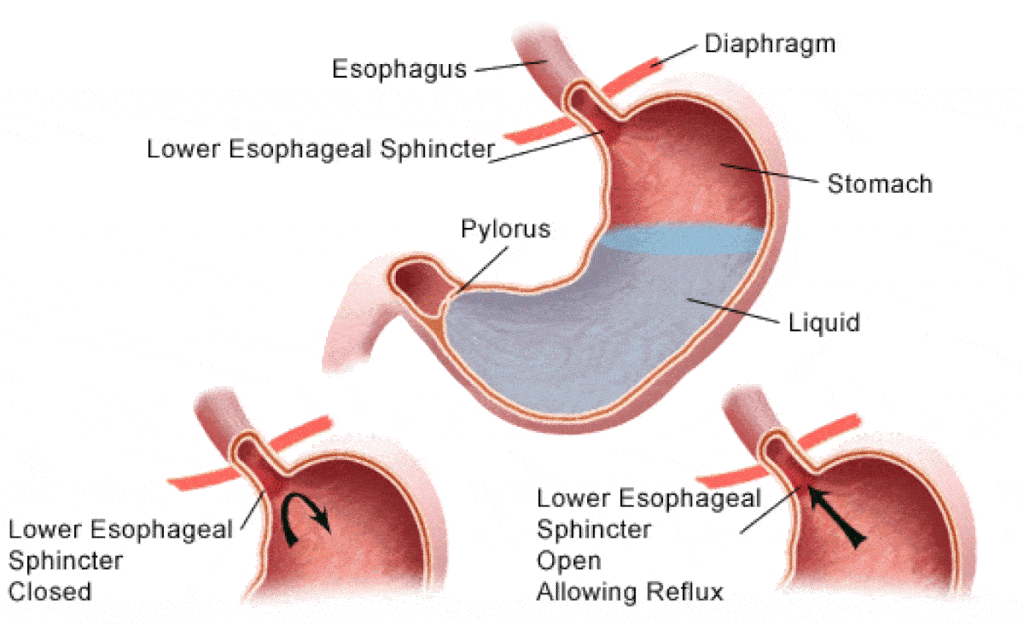
Gastroesophageal Reflux Disease (GERD) also known as acid reflux, is a chronic digestive disease. GERD occurs when stomach acid or, occasionally, stomach content, flows back into your food pipe (esophagus). The backwash (reflux) irritates the lining of your esophagus and causes GERD.
GERD signs and symptoms include:
- A burning sensation in your chest (heartburn), sometimes spreading to your throat, along with a sour taste in your mouth
- Chest pain
- Difficulty swallowing (dysphagia)
- Dry cough
- Hoarseness or sore throat
- Regurgitation of food or sour liquid (acid reflux)
- A sensation of a lump in your throat
What causes GERD (acid reflux)?
The cause of GERD is complex and may involve multiple causes. Moreover, different causes may affect different individuals or even in the same individual at different times. A small number of patients with GERD produce abnormally large amounts of acid, but this is uncommon and not a contributing factor in the vast majority of patients.
The factors that contribute to GERD are:
- lower esophageal sphincter abnormalities,
- hiatal hernias,
- abnormal esophageal contractions, and
- slow or prolonged emptying of the stomach.
What Home Remedies Treat and Sooth Acid Reflux (GERD)?
- Don’t eat within 3 hours of bedtime. This allows your stomach to empty and acid production to decrease.
- Avoid fatty or greasy foods, chocolate, caffeine, mints or mint-flavored foods, spicy foods, citrus, and tomato-based foods. These foods decrease the competence of the lower esophageal sphincter (LES).
- Avoid drinking alcohol. Alcohol increases the likelihood that acid from your stomach will back up.
- Stop smoking. Smoking weakens the lower esophageal sphincter and increases reflux.
- Lose excess weight. Overweight and obese people are much more likely to have bothersome reflux than people of healthy weight.
- Don’t lie down right after eating at any time of day.
Gallstones
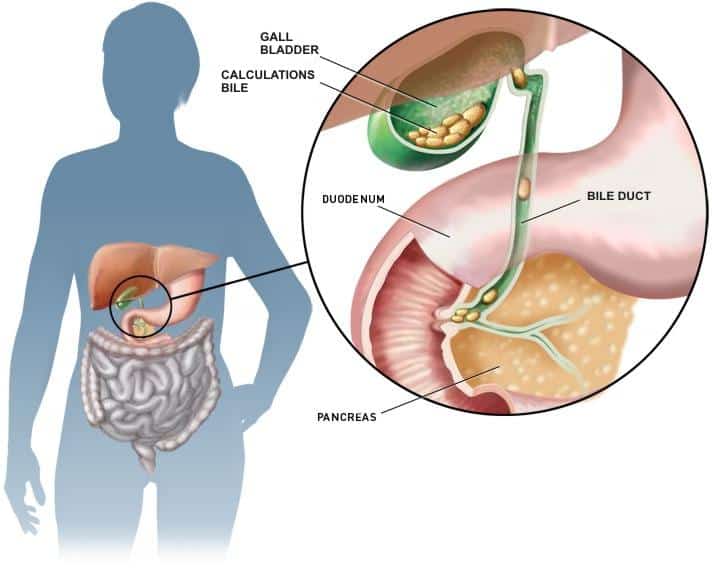
Gallstone, are stones or lumps that develop in the gallbladder or bile duct when substances in there harden. Complications of gallstones include inflammation of the gallbladder, inflammation of the pancreas, and liver inflammation.
The two main kinds are:
- Cholesterol stones. These are usually yellow-green in color. They’re the most common kind, accounting for 80% of gallstones.
- Pigment stones. These stones are smaller and darker. They’re made up of bilirubin, which comes from bile, a fluid your liver makes and your gallbladder stores.
Symptoms of Gallstones
The majority of people with gallstones have no symptoms at all. This is because the stones generally stay in the gallbladder and cause no problems. Sometimes, however, gallstones may lead to cholecystitis (inflamed gallbladder).
Common symptoms of gallbladder inflammation include:
- Pain on the right-hand side of the body, just below the ribs
- Back pain
- Pain in the right shoulder
- Nausea
- Vomiting
- Sweating
- Restlessness.
Causes of Gallstone
Gallstones are thought to be caused by an imbalance in the chemical make-up of bile inside the gallbladder. Bile is a liquid produced by the liver to aid digestion.
It’s still unclear exactly what leads to this imbalance, but gallstones can form if:
- there are unusually high levels of cholesterol inside the gallbladder (about four in every five gallstones are made up of cholesterol)
- there are unusually high levels of a waste product called bilirubin inside the gallbladder (about one in every five gallstones is made up of bilirubin)
These chemical imbalances cause tiny crystals to develop in the bile. These can gradually grow (often over many years) into solid stones that can be as small as a grain of sand or as large as a pebble.
Sometimes only one stone will form, but there are often several at the same time.
Celiac Disease
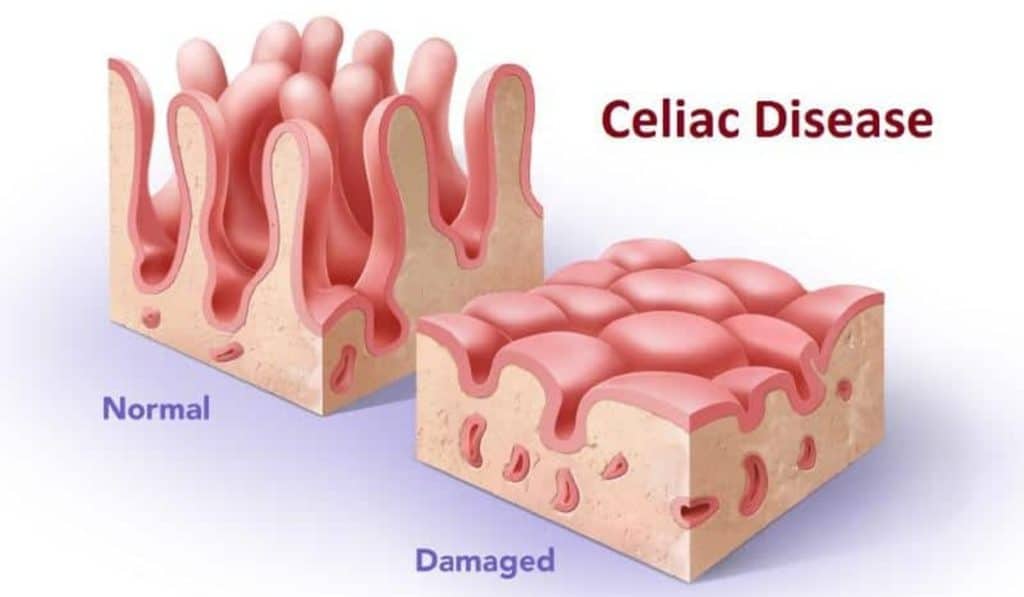
Celiac Disease, is a serious genetic autoimmune disease. It is triggered by consuming a protein called gluten, which is found in wheat, barley, and rye. When people with celiac disease eat foods containing gluten, their immune system responds by damaging the finger-like villi of the small intestine. When the villi become damaged, the body is unable to absorb nutrients into the bloodstream, which can lead to malnourishment.
Left untreated, people with celiac disease are at risk for serious health consequences, like other autoimmune diseases, osteoporosis, thyroid disease, and even certain cancers.
Symptoms
The signs and symptoms of celiac disease can vary greatly and are different in children and adults. The most common signs for adults are diarrhea, fatigue and weight loss. Adults may also experience bloating and gas, abdominal pain, nausea, constipation, and vomiting.
However, more than half of adults with celiac disease have signs and symptoms that are not related to the digestive system, including:
- Anemia, usually resulting from iron deficiency
- Loss of bone density (osteoporosis) or softening of bone (osteomalacia)
- Itchy, blistery skin rash (dermatitis herpetiformis)
- Damage to dental enamel
- Mouth ulcers
- Headaches and fatigue
- Nervous system injury, including numbness and tingling in the feet and hands, possible problems with balance, and cognitive impairment
- Joint pain
- Reduced functioning of the spleen (hyposplenism)
- Acid reflux and heartburn
Children
In children under 2 years old, typical signs and symptoms of celiac disease include:
- Vomiting
- Chronic diarrhea
- Swollen belly
- Failure to thrive
- Poor appetite
- Muscle wasting
Older children may experience:
- Diarrhea
- Constipation
- Weight loss
- Irritability
- Short Stature
- Delayed puberty
- Neurological symptoms, including attention-deficit/hyperactivity disorder (ADHD), learning disabilities, headaches, lack of muscle coordination and seizures
What causes celiac disease?
Gluten is a protein found in wheat, barley, and rye. In some people who are exposed to gluten in their diet, an enzyme called tissue transglutaminase changes the gluten into a chemical that causes an immune response, leading to inflammation of the lining of the small intestine. The normal villi that make up the lining of the intestine are blunted and destroyed, preventing the normal absorption of nutrients from the diet.
This malabsorption of vitamins, minerals, and other nutrients may lead to damage to other organs in the body, such as the liver, bone, and brain’ that depend on those nutrients to function normally. In children, the lack of effective nutrition because of malnutrition can lead to abnormal growth and development
How Is Celiac Disease Treated in Allopathy?
The only way to treat celiac disease is to permanently remove gluten from your diet, you can’t eat any foods that contain gluten (including wheat, rye, barley, and oats). Dropping gluten from your diet usually improves the condition within a few days and eventually ends the symptoms of the disease. In most cases, the villi are healed within six months.
You’ll have to remain on this diet for the rest of your life; eating any gluten at all can damage the intestine and restart the problem.
Some people with celiac disease have so much damage to their intestines that a gluten-free diet will not help them.
Crohn’s Disease
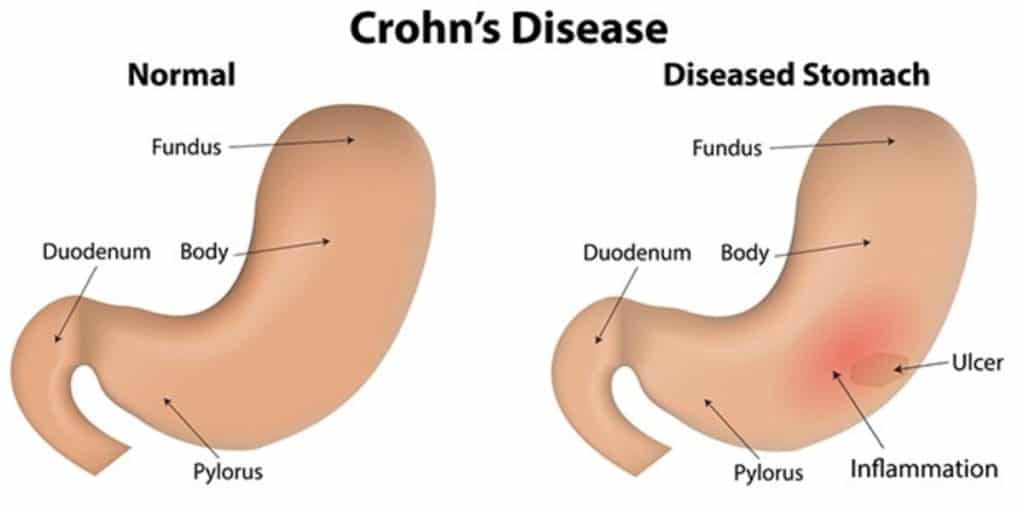
Crohn’s Disease is an ongoing condition that causes inflammation of the digestive tract, or the GI (gastrointestinal) tract (the gut). Crohn’s disease may also be called ileitis or enteritis.
Crohn’s disease can affect any part of the gut, from the mouth all the way down to the anus. In the majority of cases the lower part of the small intestine – the ileum – is affected. Patients with Crohn’s disease experience several unpleasant symptoms, including intestinal ulcers, fatigue, inflammation, discomfort, and pain; the condition makes the intestines empty frequently, resulting in diarrhea.
What Does It Feel Like to Have Crohn’s Disease?
Everyone experiences Crohn’s disease differently. People may have some symptoms more often than other symptoms, or they may not experience certain symptoms at all. Below is a list that includes some common symptoms of Crohn’s disease.
- Diarrhea
- Abdominal pain
- Fever
- Rectal bleeding
- Weight loss
- Abscesses (a localized infection)
- Fistulas (abnormal tube connecting 2 hollow organs, for instance the vagina and colon)
- Intestinal obstructions (an object blocking the normal flow of your intestines)
What are the less common symptoms of Crohn’s?
In nearly one-third of people, Crohn’s disease may be associated with additional symptoms such as:
- Joint inflammation
- Skin inflammation
- Eye inflammation
What causes Crohn’s disease?
It isn’t clear what causes Crohn’s disease. However, the following factors may influence whether you get it:
- Your immune system
- Your genetics
- Your environment
Up to 20 percent of people with Crohn’s disease also have a parent, child, or sibling with the disease.
Certain things can affect the severity of your symptoms. This includes:
- Whether you smoke
- Your age
- Your stress levels
Ulcerative colitis (UC)
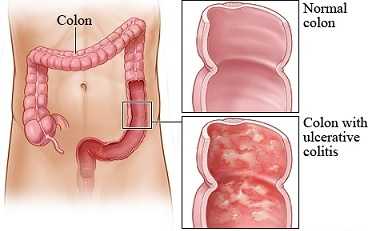
Ulcerative colitis (UC), is a long-term condition that results in inflammation and ulcers of the colon and rectum. The primary symptom of active disease is abdominal pain and diarrhea mixed with blood. Weight loss, fever, and anemia may also occur. Often symptoms come on slowly and can range from mild to severe. Symptoms typically occur intermittently with periods of no symptoms between flares. Complications may include megacolon, inflammation of the eye, joints, or liver, and colon cancer.
What are the symptoms of Ulcerative colitis (UC)?
- Belly pain or cramps.
- Diarrhea.
- Bleeding from the rectum.
Some people also may have a fever, may not feel hungry, and may lose weight. In severe cases, people may have diarrhea 10 to 20 times a day.
The disease can also cause other problems, such as joint pain, eye problems, or liver disease.
Causes of Ulcerative colitis
Ulcerative colitis happens when your immune system makes a mistake. Normally it attacks invaders in your body, like the common cold. But when you have Ulcerative colitis (UC), your immune system thinks food, good gut bacteria, and the cells that line your colon are the intruders. White blood cells that usually protect your work against the lining of your colon instead. They cause inflammation and ulcers.
Dietary Remedies for Ulcerative Colitis
Some herbal or organic remedies may help promote gut health and prolong the time between remissions (flares).
- Dietary modification includes the elimination of food allergens and optimizing living conditions. A relatively high proportion of Europeans (either primary or of European descent) have an allergy to gluten, a substance found in wheat. Anecdotal evidence suggests that gluten may aggravate ulcerative colitis symptoms, but this is far from an established link.
- Some have advocated eliminating dairy products and high levels of carbohydrates from the diet.
- Low-fat diets seem to be particularly useful in delaying the recurrence of ulcerative colitis. Olive oil, medium-chain triglycerides, omega-3 fatty acids, and fermentable fiber might have a protective effect.
- Lifestyle modification includes adopting exercise and regular physical activity, stress-relieving therapies, and quitting smoking.
- High fiber intake may be helpful in some patients. Besides improving bowel regularity, it may help in the removal of toxins and chemicals from the body.
- High vitamin C intake has a protective effect. Vitamin C–rich foods are associated with a longer remission phase (these include berries, spinach, bell pepper, and parsley).
- Similarly, the elimination of alcohol, meat, processed foods, and high-carbohydrate foods may decrease the frequency and severity of flares.
Herbal Remedies:
A few well-known home remedies for the management of ulcerative colitis include:
- Psyllium seed/husk enhance gut motility, alleviate the symptoms of constipation, and improve the elimination of waste.
- Boswellia is a naturally occurring herb obtained from the resin part of tree bark. The primary mode of action of Boswellia in the management of ulcerative colitis is the inhibition of certain chemical reactions that produce inflammatory mediators.
- Bromelain is commercially available in supplemental formulations and includes proteolytic enzymes that alleviate the symptoms and reduce the frequency of flares.
- Probiotics introduce healthy gut bacteria to restore and maintain a natural microbial flora in the gut. This may reduce harmful inflammatory responses and maintain remission.
- Turmeric, the spice used in curry, may help patients with ulcerative colitis. Specifically, the curcumin found in turmeric appears to improve the effectiveness of traditional medical therapy.
- Gingko Biloba has been effective in treating experimental colitis in rodents, but this has not been shown in humans.
Irritable Bowel Syndrome (IBS)
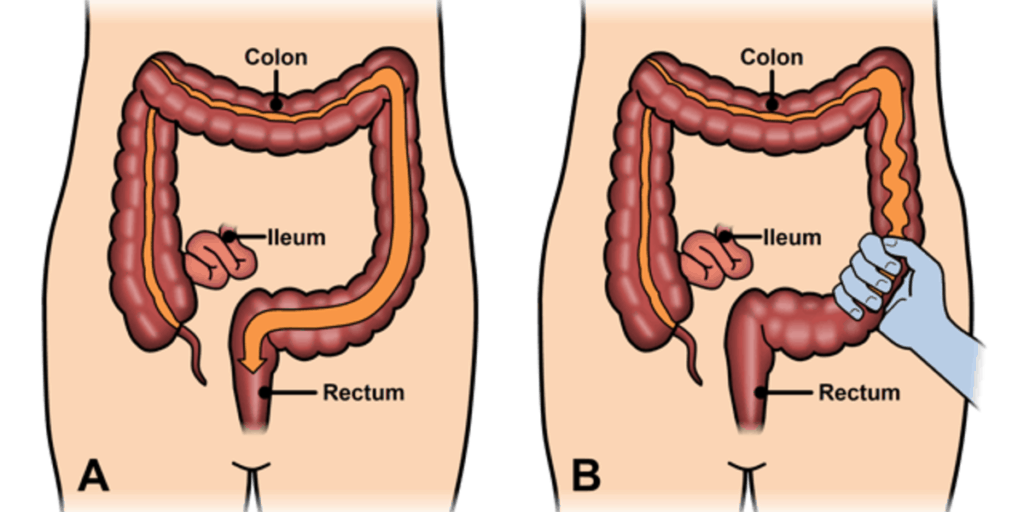
Irritable Bowel Syndrome (IBS), is a fairly common problem with the way the large intestine works. The large intestine (also known as the colon) absorbs water and nutrients from the partially digested food that enters the colon from the small intestine. Anything that is not absorbed is slowly moved on a pathway out of your body. These undigested and unabsorbed food particles are also known as stool, a bowel movement, or poop. It can cause bouts of stomach cramps, bloating, diarrhea and constipation.
Symptoms of Irritable Bowel Syndrome (IBS)
The signs and symptoms of irritable bowel syndrome can vary widely from person to person and often resemble those of other diseases. Among the most common are:
- Abdominal pain or cramping
- A bloated feeling
- Gas
- Diarrhea or constipation — sometimes alternating bouts of constipation and diarrhea
- Mucus in the stool
For most people, IBS is a chronic condition, although there will likely be times when the signs and symptoms are worse and times when they improve or even disappear completely.
Cause of Irritable Bowel Syndrome (IBS)
The exact cause of irritable bowel syndrome (IBS) isn’t known. But health experts believe that faulty communication between the brain and the intestinal tract is one cause of symptoms. In some people, this miscommunication causes abnormal muscle contractions or spasms, which often cause cramping pain. The spasms may speed the passage of stool, causing diarrhea. Or they may slow it down, causing constipation or bloating.
Many people who have IBS seem to have unusually sensitive intestines. It isn’t known why their intestines are more likely to react strongly to the elements that contribute to IBS. People who have IBS may start having symptoms because of one or more factors, including:
- Eating (though no particular foods have been linked with IBS).
- Stress and psychological issues, such as anxiety and depression.
- Hormonal changes, such as during the menstrual cycle.
- Some medicines, such as antibiotics.
- An infection in the digestive tract, such as salmonella.
- Genetics. IBS may be more likely to occur in people who have a family history of the disorder.
The 7 Signs You Have Leaky Gut
1. Food Sensitivities – People affected by food sensitivities oftentimes find that leaky gut is to blame. Because of the onslaught of toxins that enter the bloodstream, the immune systems of people with intestinal hyperpermeability are on overdrive mass-producing various antibodies, which makes their bodies more susceptible to antigens in certain foods (especially gluten and dairy).
2. Inflammatory Bowel Disease – Researchers from Hungary have recently uncovered that elevated gut permeability is oftentimes localized to the colon in people suffering from irritable bowel syndrome and ulcerative colitis.
Another study suggests that, for Crohn’s disease patients, a leaky guy is prevalent in majority cases and even up to 10% – 20% of their “clinically healthy relatives,” which suggests a potential genetic component. Zinc supplementation has been found to be quite effective at tightening up the intestinal tight junctions in these cases.
3. Autoimmune Disease – The key to understanding how leaky gut can cause autoimmune disease is through the research done on a protein known as “zonulin.”
Zonulin is the only physiological modulator of intercellular tight junctions described so far that is involved in trafficking of macromolecules and, therefore, intolerance/immune response balance. When the finely tuned zonulin pathway is deregulated in genetically susceptible individuals, both intestinal and extraintestinal autoimmune, inflammatory, and neoplastic disorders can occur.”
4. Thyroid Problems – One of the autoimmune diseases that leaky gut syndrome may directly affect is Hashimoto’s disease. Also known as “chronic thyroiditis,” this disorder can lead to hypothyroidism, impaired metabolism, fatigue, depression, weight gain, and a host of other concerns.
5. Malabsorption – Various nutritional deficiencies result from leaky gut include vitamin B12, magnesium and key enzymes that help digest food. It is recommended that people with leaky gut supplement with whole food based multi-vitamin and live probiotic to not only help digest the food that they eat but to make sure that they get the vital nutrition that they need.
6. Inflammatory Skin Conditions – First described over 70 years ago, the gut-skin connection theory has described how intestinal hyper-permeability can cause a slew of skin conditions; particularly acne and psoriasis. Generally, dangerous creams and drugs are prescribed for these skin disorders, yet they can oftentimes be fixed by healing the gut!
7. Mood Issues and Autism – According to a study published in the journal Neuro Endocrinology Letters, leaky gut has been shown to cause various neurocognitive disorders. For example, the inflammatory response characteristic of intestinal hyperpermeability triggers the release of pro-inflammatory cytokines and other chemicals that induce depression.
The Importance of Gut in Autism

Recent research shows that more than 50% of children with autism have GI symptoms, food allergies, and Intolerance. It’s obvious from talking to parents that GI problems are a major concern in children with autism. List serves dealing with autism have discussions on GI issues all the time.
The digestive tract is the heart of the innate immune system. The innate immune system is a barrier defense against microbes. This barrier system also plays a key role in regulating inflammation. Digestion and inflammation go hand in hand, and both are essential components of successful alternative treatment.
In the digestive tracts of humans, there exists a complex, symbiotically integrated network of trillions of microorganisms known as the “gut flora” or “microflora”. The idea that all these bacteria and microorganisms have taken up a home in our gut may initially seem startling, but they serve a number of beneficial purposes, such as aiding digestion and offering immunity from infection.
The potential link between gut flora and autism arose as researchers identified the increased risk of neurodevelopmental disorders, such as autism, among children born from mothers who were obese during pregnancy. The microflora of obese people is demonstrably different from those who are not obese, and as a result, connections have been made to the gut issues often reported in autistic people.
Many parents ask “where do we start”? The answer is almost always with the DIGESTIVE TRACT.
Research shows that children with autism have a higher rate of inflammation and immune dysregulation in the digestive tract. These abnormalities cause inflammation. Inflammation plus a genetic predisposition creates a “cloud” in the brain. Clearing that “cloud’ of inflammation creates a tremendous amount of potential for development.
Causes and symptoms of digestive dysfunction include:
- Food allergies and sensitivities
- Enzyme deficiency or dysfunction
- Chronic constipation and/or diarrhea
- Mucous, blood or undigested food in stool
- Pain, cramping or discomfort
- Bloating
- Leaky Gut
- Issues with absorption
Addressing digestive issues is the key to successful alternative treatment for autism.
What Causes Digestive Impairment that Leads to Inflammation and Immune Problems?
This is a very exciting area of research because it begins to gather information that will help prevent autism and other developmental disorders. At a staggering rate of 1 in 150 Canadian children, this issue affects everyone.
- Food allergies and sensitivities and early introduction of allergens
- C-Section and IV antibiotics – don’t allow natural colonization of good bacteria in the intestine
- Vaccinations, metals and environmental toxins – have the ability to shut down enzymes that breakdown food (casein, gluten, soy, corn, etc)
- GMO – Genetically modified foods disrupt innate immune function in the digestive tract by introducing genetic material from other organisms.
- Antibiotics – kill good bacteria which protects the body from other microbes, helps to absorb nutrients and regulates inflammation
How we treat GUT ISSUES
With us, we get to the root of the problem, identifying and eliminating the allergen that is causing the recurring symptoms.
We offer the prospect of relief to those who suffer from addiction and allergies by reprogramming the brain to perfect health. Just like rebooting a computer, we can reboot our nervous system to overcome the adverse reactions of brain and body.
To fully understand what we do, one needs to know some Oriental medical principles. We take the acupuncture and Oriental medical theories and a technique that can eliminate the reaction from the root.
Addictions can definitely cause illness. Continuous contact with an allergen produces toxins in the body and causes blockages in the meridians. If these blockages are not cleared, reactions to the allergens often produce symptoms that mimic other diseases.

By clearing food allergens from the protocol, we strengthen the immune system, improve digestion and absorption. This allows the body to get the necessary nutrients, which are essential for life.
One allergen is cleared per visit. Each individual has a different genetic makeup and health history so the number of sessions required varies from one individual to another. For some people, allergens are cleared immediately however, for others it may take many sessions to accomplish the desired results.
Some people might raise their eyebrows and ask, “Can you really eliminate my Gut Issues?” We answer with a resounding “YES!”
NAET Cured My RP & Ulcerative Colitis!
Since I was a small child I suffered from recurring canker sores. At 34, I was diagnosed with Ulcerative Colitis, which caused severe stomach pain and diarrhea. Approximately 6 days after being diagnosed with Colitis, I developed symptoms that were later diagnosed to be Relapsing Polychondritis or RP. RP is an autoimmune disorder that destroys the cartilage of the body.
I sought medical attention for both RP and Ulcerative Colitis with both doctors prescribing high doses of drugs to attack the symptoms. Both my Rheumatologist and Gastroenterologist could not tell me why I developed these diseases or seek to cure the problem causing them. Both doctors indicated that I would be on drugs for the rest of my life.
My wife and I refused to accept that I developed these diseases by chance and actively looked for our own cure. She put me on a natural diet to remove all hormones and pesticides and eventually took my diet down to that of rice and beans to establish if a food was the culprit. Through monitoring my diet and symptoms, my wife determined that consumption of dairy products appeared to increase the severity of symptoms, both RP and Ulcerative Colitis.
At this time a friend told me about NAET and Dr. Alo who studied under Dr. Devi. Through NAET, Dr. Alo determined I was allergic to various foods such as dairy products, shellfish, some vegetables and food additives which I was eventually desensitized through NAET. I no longer get canker sores and can eat anything I want.
At my last Colonoscopy, the doctors determined I no longer have any signs of Ulcerative Colitis. My medical doctors refuse to accept that food caused my problems however, they are amazed at my turnaround and are actively reducing my drugs with an eventual goal of stopping all medications.
My Rheumatologist has given me a clean bill of health and I can only attribute my current status to that of NAET. I thank God for NAET. I recommend, that anyone suffering from an ailment, investigate NAET.
John E. Meadows
Mission Viejo, CA
Connect with us through our Facebook page at www.facebook.com/NAETDubai or visit: www.naetdubai.com. You will find a wealth of information here along with an opportunity to speak confidentially through WhatsApp 056-639 0197 or Phone Call 04-420 1633.
You may also email us at admin@naetdubai.com




14 Responses
Thank you ???? Please don’t forget to subscribe to our blog and you will receive mails once we published new blogs.
Thank you 🙂
Thank you 🙂
Thank you 🙂 .Please don’t forget to subscribe to our blog and you will receive mails once we published new blogs.
This post offers clear idea for the new people of blogging, that genuinely how to do running a blog.
Hi Rosa, thank you for your comment ???? Please don’t forget to subscribe to our blog and you will receive mails once we published new blogs.
Keep on working, great job!
Thanks Anjing!
Thanks!
Thanks!
Thank you so much for your comment. Please don’t forget to subscribe to our blogs. Feel free to contact us if you need any further information.
WOW just what I was looking for. Came here by searching for lich van su
Thank you for some other wonderful article. Where else may just
anybody get that type of info in such an ideal approach of writing?
I’ve a presentation subsequent week, and I’m at the search for such
information.
Hi there to all, the contents present at this site are really amazing for people experience, well, keep up the nice
work fellows.